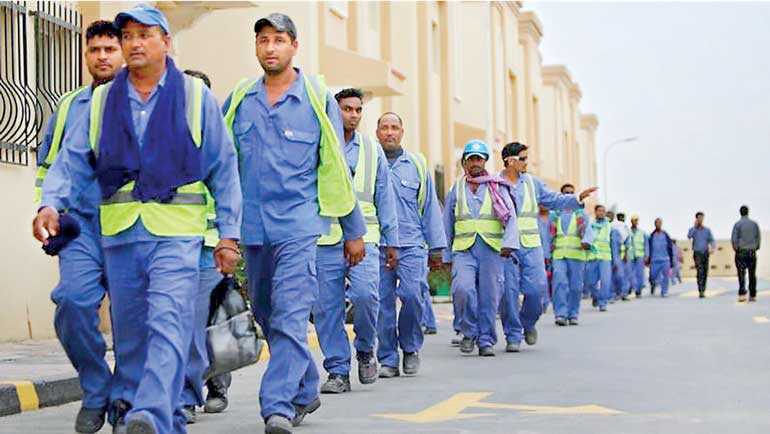Tuesday Feb 17, 2026
Tuesday Feb 17, 2026
Friday, 5 October 2018 00:00 - - {{hitsCtrl.values.hits}}

The Government of Qatar will soon be simplifying the migrant work visa application process that will expedite visa processing for Sri Lankan migrant workers.
This service, which will first be introduced in Sri Lanka and then rolled out in other key South Asian cities, will be made available through Qatar visa centers, which are directly supervised by the concerned authorities in Qatar and managed by Biomet Visa Services Lanka, a subsidiary of Biomet Services Pte. Ltd., a service provider authorised by Qatar.
The new visa process will be transformative for aspiring migrant workers. Going forward, once the initial visa approval is issued by Qatari authorities, migrant workers can complete the medical test and biometric enrolment requirements within their country of origin within a shorter period. The old visa process in Qatar requires medical testing, done at accredited laboratories, plus a host of other requirements that could take sometimes weeks to be completed.
According to reports, Sri Lankan worker remittances in Qatar account for $ 400-500 million out of the $ 7.16 billion in worker remittance recorded in 2017. Further, Sri Lanka’s foreign remittance earnings from Qatar will likely double over the next few years, statistics show. This means that local aspiring employees will enter Qatar in many numbers. To quantify, the number of Sri Lankan migrant workers in Qatar is expected to reach 300,000 from the current 140,000 in the next couple of years.
The Sri Lankan and Qatar governments have identified many areas for collaboration between the two countries which will also see more growth in employment and remittances.
Qatar as usual has set the trend for cutting-edge visa processing and biometric enrollment solutions, providing a clear, simple and effective solution to enter the State. The convenience that biometrics can bring to this ecosystem is unprecedented, said Biomet Services Business Head Suhail Shaikh.
Medical tests, a key component of the visa procedure that was conducted after the migrant worker reached Qatar, will be available in-house at the Qatar Visa Center as part of the visa application processing and biometric enrollment regime. Some of the key medical tests that are provided include an essential medical check-up, various types of blood tests, an x-ray and administration of vaccinations as required by the Ministry of Public Health of Qatar.
State-of-the-art healthcare facilities and equipment will be deployed, authorised by the Qatar government and certified by local healthcare authorities, backed by a team of highly qualified healthcare professionals with internal systems and processes based on the latest medical standards and best practices.
Efficient recruitment is a critical part of a successful company since hiring the wrong person may cost plenty of money and time. Therefore, improving the recruitment process could benefit the employment process, cut off exploitative practices and help establish a more transparent and accountable procedure.
Importantly, biometric authentication, introduced as a vital element of the new Qatar visa system, will drastically mitigate identity replacements, false dates of birth and other loopholes used randomly in pink-collar or female house worker categories.
Biometric authentication is seeing rapid growth and shows great promise across a wide variety of financial applications. Research expects that biometrics will be used for more than 18 billion transactions by 2021, growing at a compound annual growth rate of 83.7% from 2016 levels.
In an era when all stakeholders in the ecosystem are rightly focused on security and risk management, biometrics stands to play a critical role. The new visa processing offers participants tangible benefits such as greater convenience and enhanced security, particularly when used as part of a layered, risk-based security strategy.
In the current system, there are elements and steps in the visa process that will be of particular benefit to the incumbent employee in terms of security and a transparent system where the recruit has access to their employment contract.